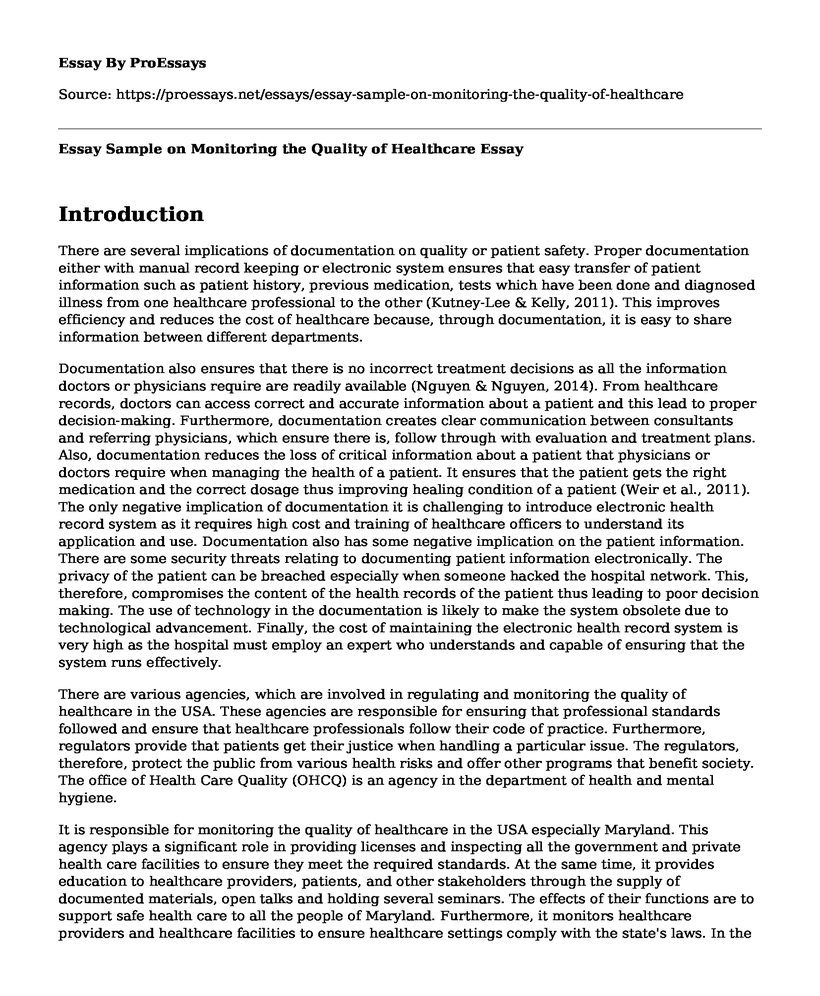Introduction
There are several implications of documentation on quality or patient safety. Proper documentation either with manual record keeping or electronic system ensures that easy transfer of patient information such as patient history, previous medication, tests which have been done and diagnosed illness from one healthcare professional to the other (Kutney-Lee & Kelly, 2011). This improves efficiency and reduces the cost of healthcare because, through documentation, it is easy to share information between different departments.
Documentation also ensures that there is no incorrect treatment decisions as all the information doctors or physicians require are readily available (Nguyen & Nguyen, 2014). From healthcare records, doctors can access correct and accurate information about a patient and this lead to proper decision-making. Furthermore, documentation creates clear communication between consultants and referring physicians, which ensure there is, follow through with evaluation and treatment plans. Also, documentation reduces the loss of critical information about a patient that physicians or doctors require when managing the health of a patient. It ensures that the patient gets the right medication and the correct dosage thus improving healing condition of a patient (Weir et al., 2011). The only negative implication of documentation it is challenging to introduce electronic health record system as it requires high cost and training of healthcare officers to understand its application and use. Documentation also has some negative implication on the patient information. There are some security threats relating to documenting patient information electronically. The privacy of the patient can be breached especially when someone hacked the hospital network. This, therefore, compromises the content of the health records of the patient thus leading to poor decision making. The use of technology in the documentation is likely to make the system obsolete due to technological advancement. Finally, the cost of maintaining the electronic health record system is very high as the hospital must employ an expert who understands and capable of ensuring that the system runs effectively.
There are various agencies, which are involved in regulating and monitoring the quality of healthcare in the USA. These agencies are responsible for ensuring that professional standards followed and ensure that healthcare professionals follow their code of practice. Furthermore, regulators provide that patients get their justice when handling a particular issue. The regulators, therefore, protect the public from various health risks and offer other programs that benefit society. The office of Health Care Quality (OHCQ) is an agency in the department of health and mental hygiene.
It is responsible for monitoring the quality of healthcare in the USA especially Maryland. This agency plays a significant role in providing licenses and inspecting all the government and private health care facilities to ensure they meet the required standards. At the same time, it provides education to healthcare providers, patients, and other stakeholders through the supply of documented materials, open talks and holding several seminars. The effects of their functions are to support safe health care to all the people of Maryland. Furthermore, it monitors healthcare providers and healthcare facilities to ensure healthcare settings comply with the state's laws. In the process, they are promoting quality healthcare through fostering legal compliance and quality service to patients. This agency ensures that care providers have the right knowledge and qualification that can enable them to offer high quality care. The agency also provides that healthcare setting has the proper facilities that meet Government requirement and in the process protect the public from facing various health risks that may endanger their lives.
References
Weir, C.R., Hammond, K.W., Embi, P.J., Efthimiadis, E.N., Thielke, S.M.,& Hedeen, A.N. (2011). An exploration of the impact of computerized on patient documentation on clinical collaboration. International Journal of Medical Informatics, 80, 62-71.doi:10.1016/j.ijmedinf.2011.01.003
Nguyen, L., Bellucci, E., & Nguyen, L.T. (2014). Electronic health records: An evaluation of information system impact and contingency factors. International Journal of Medical Informatics, 83, 779-796. http://dx.doi.org/10.1016/j.ijmedinf.2014.06.011
Kutney-Lee, A. & Kelly, D. (2011). The effect of hospital electronic health record on nurse-assessed quality of care and patient safety. J Nurs Adm., 41(11): 466-472. doi:10.1097/NNA.0b013e3182346e4bpatient safety.
Cite this page
Essay Sample on Monitoring the Quality of Healthcare. (2022, Dec 08). Retrieved from https://proessays.net/essays/essay-sample-on-monitoring-the-quality-of-healthcare
If you are the original author of this essay and no longer wish to have it published on the ProEssays website, please click below to request its removal:
- Paper Example on Communication Skills and Conflict Resolution in Nursing
- Paper Example on Enhanced Performance in Emerging Pharmaceuticals: Changes for Improved Efficiency
- Essay Example on Single Injury Leads to Decades of Tau Pathology, Dementia
- Essay Example on Animal-Assisted Therapy Improves Outpatient Oncological Treatment in Teens
- Essay on Women's Autonomy in Abortion: Controversy Over Unplanned Pregnancies
- Rise in Diseases: A Call for Improved Healthcare Facilities - Essay Sample
- Paper Example on Governments Create Public Health Law to Combat Covid-19







